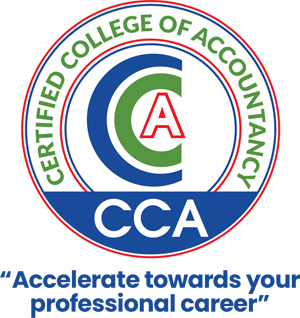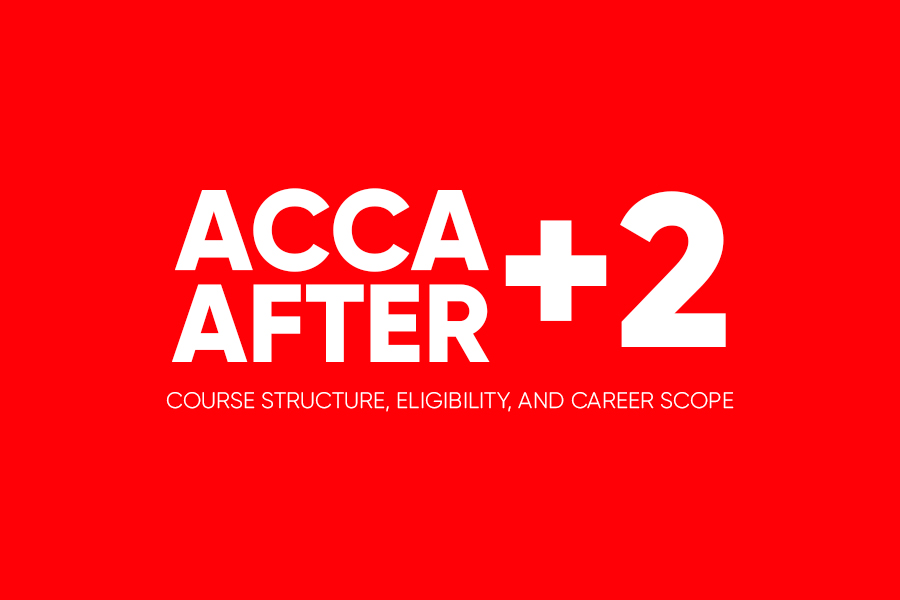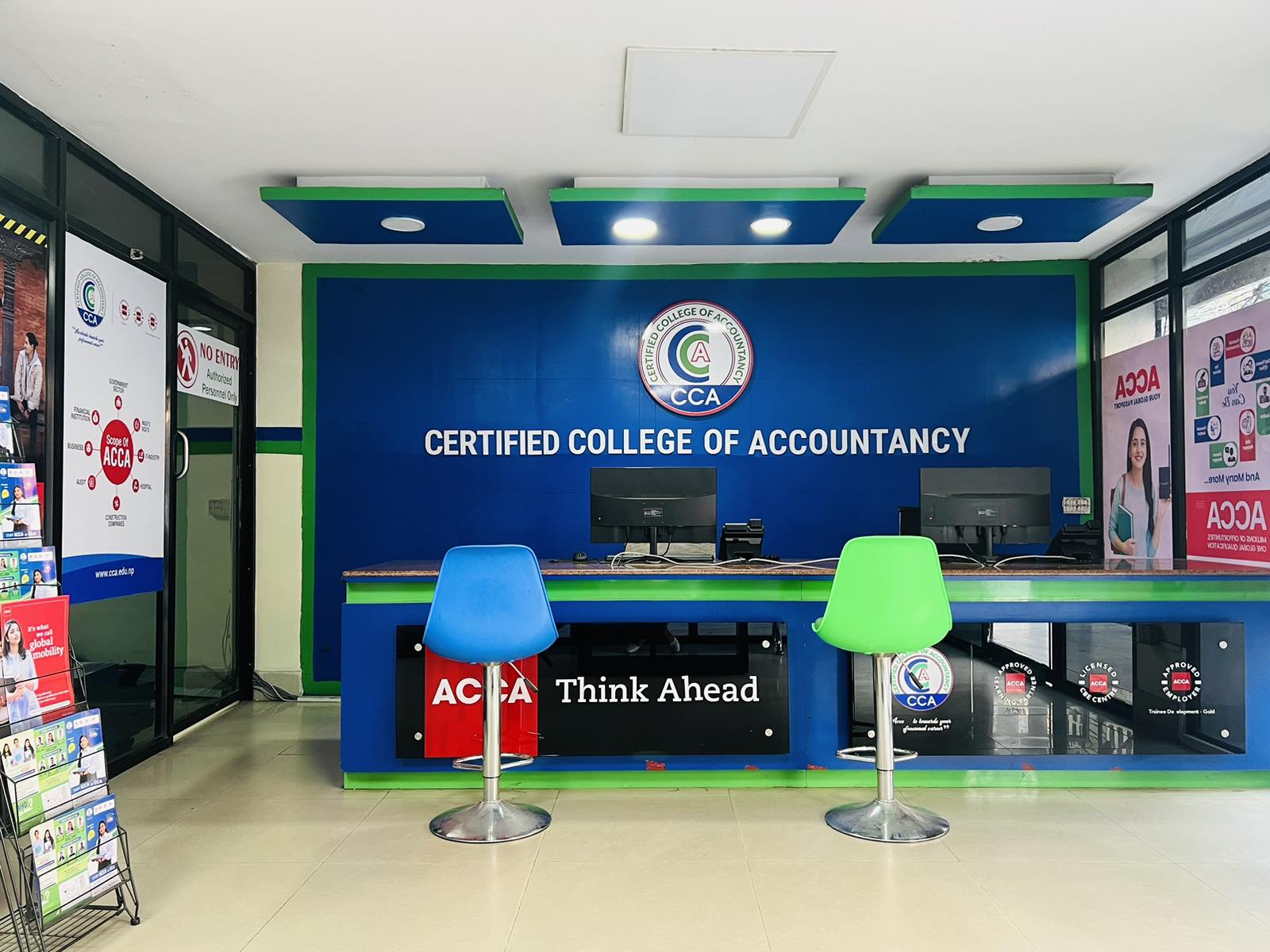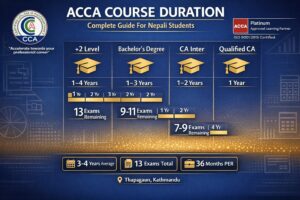Are you in Grade 12 and thinking about your future career? Are you interested in working with businesses, money, or numbers? If yes, ACCA might be the perfect path for you.
This guide explains what ACCA is, how it works, why it’s a great career choice, and how you can get started; even if you have no experience in accounting.
What is ACCA?
ACCA stands for the Association of Chartered Certified Accountants. It’s a professional qualification from the United Kingdom that trains people to become experts in finance, accounting, auditing, taxation, and business management.
Think of ACCA like a passport to a global career in finance. It’s accepted in over 180 countries, including the UK, Australia, UAE, Singapore, and Nepal.
Why Should I Choose ACCA?
Here’s why thousands of students around the world choose ACCA:
- Globally Recognized – You can work in different countries without starting over.
- Start Right After 12th Grade – No need for a university degree to begin.
- Flexible Study Options – Study full-time, part-time, online, or at a coaching center.
- Practical and Professional Curriculum – You learn real-world skills that employers want.
How Does the ACCA Course Work?
The ACCA course is made up of three levels with a total of 13 papers (subjects):
1. Applied Knowledge (Beginner Level – 3 papers)
- Basic introduction to accounting and business concepts.
- Subjects include:
- Business and Technology (BT)
- Management Accounting (MA)
- Financial Accounting (FA)
2. Applied Skills (Intermediate Level – 6 papers)
- Covers core areas like taxes, audit, financial reporting, and law.
- Subjects include:
- Corporate and Business Law (LW)
- Performance Management (PM)
- Taxation (TX)
- Financial Reporting (FR)
- Audit and Assurance (AA)
- Financial Management (FM)
3. Strategic Professional (Advanced Level – 4 papers)
- Focuses on leadership, ethics, and strategic decision-making.
- 2 core subjects (must do):
- Strategic Business Leader (SBL)
- Strategic Business Reporting (SBR)
- 2 optional subjects (choose from 4):
- Advanced Financial Management (AFM)
- Advanced Performance Management (APM)
- Advanced Taxation (ATX)
- Advanced Audit and Assurance (AAA)
Exams happen 4 times a year: in March, June, September, and December.
You can take up to 4 exams in one sitting, depending on your pace. Students usually take 1-2 papers (or subjects) per sitting.
What About Work Experience?
To become a fully qualified ACCA member, passing exams isn’t enough; you also need real-world experience.
What’s Required?
- 3 years of relevant work experience (you can do this before, during, or after exams)
- Completion of the PER (Practical Experience Requirement) – a checklist of workplace skills
What Jobs Count?
Any role where you work with money, accounts, or business decisions, such as:
- Audit trainee
- Finance intern
- Accounts assistant
- Tax analyst
- Bookkeeping roles
- Internal audit assistant
You can even start internships during your studies.
Is ACCA Worth It? Career Scope in Nepal and Abroad
Yes! ACCA offers strong career opportunities in Nepal and internationally.
In Other Countries:
- Work in countries like the UK, Australia, UAE, Qatar, Singapore, and Canada
- Many multinational companies prefer ACCA members for finance roles
In Nepal:
You can work in:
- Top audit firms
- Outsourcing and consulting firms
- Banks and financial institutions
- Corporates and NGOs
- Startups or private companies
As you pass more papers, your salary and job options increase. Even as a student, you can start earning through internships or part-time roles.
How Much Does ACCA Cost in Nepal?
The total cost depends on how you study and which coaching center you choose.
Cost Breakdown:
- Registration and Annual Subscription Fees – Paid to ACCA UK
- Exam Fees – Increase with each level
- Tuition Fees – Varies by college/coaching center (self-study is cheaper)
Average Total Cost in Nepal:
NPR 6.5 to 7 lakhs (all 13 papers, coaching, and exam fees included)
- You can pay in installments
- Scholarships may be available for high scorers in 12th grade or A-levels
For more information visit: ACCA Course Fee In Nepal
Should I Study ACCA at a College or On My Own?
Option 1: Join a Tuition Provider (College/Coaching Center)
- Structured classes
- Help from tutors
- More likely to pass exams on the first try
Option 2: Self-Study
- Cheaper
- You control your schedule
- Ideal if you already have knowledge of accounting or if you’re working
What If I Fail an ACCA Exam?
It’s completely okay! Even top students fail a paper or two.
- You can retake the same paper as many times as needed
- Learn from your mistakes, practice more, and try again
- ACCA is designed to support your growth—not punish you for one failure
What Are Exemptions in ACCA?
If you’ve already studied similar topics (e.g., in BBA, BBS, or A-levels), you might be able to skip some papers; this is called an exemption.
Pros:
- Saves time and effort
- You can move to higher-level subjects faster
Cons:
- You still pay an exemption fee
- You might miss learning the basics if your previous studies were weak
Some students choose not to take exemptions so they can strengthen their foundation before advanced papers.
Can I Do ACCA Along With a University Degree?
Yes! Many students study ACCA alongside a degree like:
- BBS
- BBA
- BCom
In fact, Oxford Brookes University (UK) offers a BSc in Applied Accounting, which you can earn during your ACCA journey; no need to study separately!
Is ACCA recognized in Nepal?
Yes, it is!
- ACCA is officially recognized by ICAN (the national accounting body of Nepal), though the agreement is limited
- Many employers, including the Big 4 audit firms, banks, and corporations, prefer ACCA students
- ACCA is becoming more popular and is often compared to ICAN and ICAI






